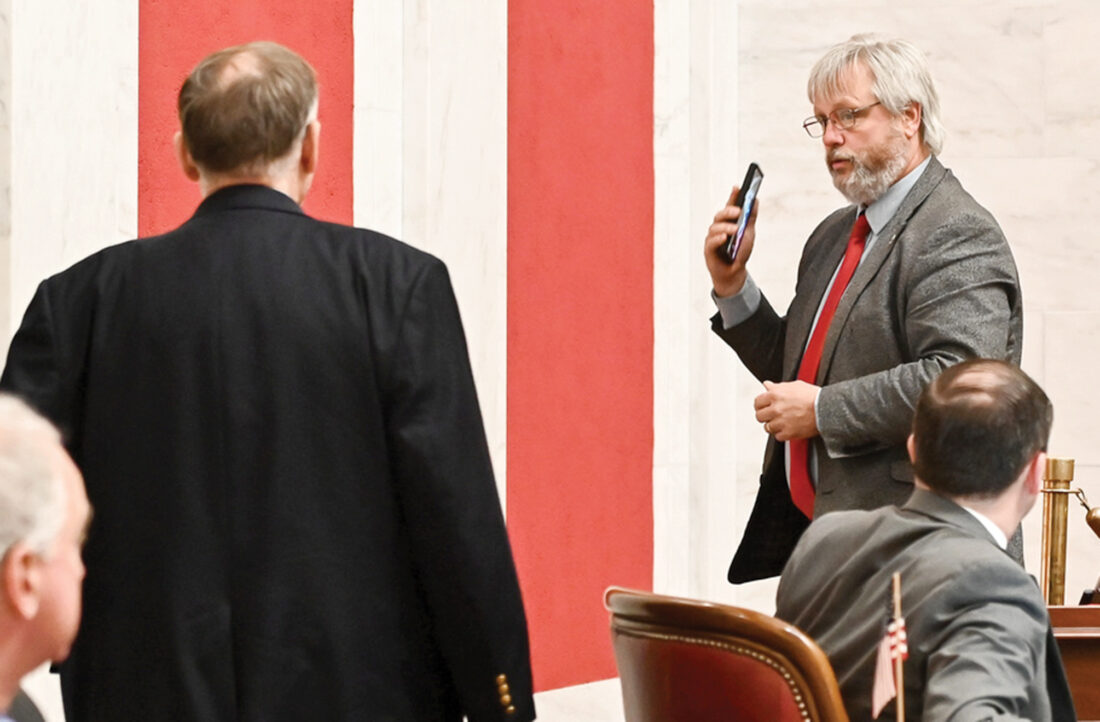W.Va. Senate erupts as it considers remaining bills

Photo Courtesy/ WV Legislative Photography The Sergeant-at-Arms of the West Virginia Senate approaches state Sen. Robert Karnes to eject him from the chamber after disrupting proceedings Friday morning.
CHARLESTON — Drama filled the West Virginia Senate Friday on the next to last day of the 2023 legislative session as some of the chamber’s far-right minority tried to slow down votes on more than 50 bills on its third reading agenda.
Friday’s floor session began with state Sen. Robert Karnes, R-Randolph, attempting to have all bills read in full. Bills are typically explained by committee chairs instead of being read in full to save time, but any member can ask for bills to be read in full.
Having bills read in full is often used by members to slow down legislation or in protest of actions made by other lawmakers.
During Thursday afternoon’s floor session, the Senate rejected a committee amendment to House Bill 3270, amending the deliberate intent statute to limit noneconomic damages to $500,000, after Senate Judiciary Committee Chairman Charles Trump, R-Morgan, said he did not support it after it was amended by state Sen. Laura Wakim Chapman to remove the word “fraudulent” from the bill, possibly opening up companies to a flood of frivolous lawsuits.
Also Thursday, Trump made a successful motion to remove House Bill 3018, limiting marriage to adults age 18 or older, from the Senate Judiciary Committee where it was rejected in a 8-9 vote and moved to the Senate floor, putting it up for passage Friday.
Karnes inquired whether bills that had already passed the Senate and come back over due to the House amending the bills could be read in full.
“Mr. President, I do not read the possibility of a waiver of reading an engrossed bill of any type,” Karnes said. “Do you believe that an engrossed bill does not have to be read fully and distinctly on the floor of this chamber?”
“This bill has been read three times previously,” said Senate President Craig Blair, R-Berkeley. “It does not apply to this, it’s been read … we’re done here.”
When the Senate got to its third reading agenda, Karnes continued to demand that bills be read in full, yelling out in the chamber for the recognition of Blair, with Blair ignoring his outbursts. Senate Majority Whip Ryan Weld, R-Brooke, cited Senate Rule 8 that requires senators to be recognized by the Senate President or presiding officer before being allowed to speak.
“It is my understanding that…the power of recognition and to recognize members of this body lies with the presiding officer,” Weld said.
When Karnes continued to disrupt the proceedings of the Senate, the body recessed for 10 minutes. Shortly before the Senate resumed its floor session, Karnes was ejected from the Senate by the Sergeant-at-Arms.
Senate President Pro Tempore Donna Boley, R-Pleasants, cited Senate Rule 51, which allows senators to be taken into custody by the Sergeant-at-Arms either by order of the Senate President, the presiding officer, or under recommendation of the Senate Rules Committee when it is believed there has been a “breach of privilege.”
Later in the day, the Senate voted 24-8 for HB 3270, which would set financial limits for legal cases involving the injury of workers who can prove deliberate intent by their employer to cause the injury. The cap on non-economic damages either two-times the amount of economic damages or $500,000, whichever is higher.
“West Virginia employers who are covered by workers (compensation) enjoy, generally speaking, immunity from employee lawsuits for workplace injuries. That is the historical trade-off made by the Workers Compensation Act,” Trump explained. “However, under current law an employer can lose that immunity under what is known as a deliberate intent lawsuit.”
The committee amendment rejected by the Senate removed the word “fraudulently” from a provision dealing with coal companies accused of concealing dust and air quality samples in cases involving coal miners with pneumoconiosis, also known as Black Lung. Chapman was one of the eight no votes on the bill.
“Deliberate intent is the worst of the worst cases. If there is mere negligence, an accident, workers comp takes over. This is reckless, criminal, beyond unsafe and against industry standards that this deliberate intent law is there for,” Chapman said. “I think we have already done enough with deliberate intent.”
HB 3018 passed the Senate 31-1 after being amended Friday. The bill would have established that age 18 is the age of consent for marriage and removed the ability for underage teenagers to obtain consent to marry through their parents, legal guardians, or by petition to a circuit court if under the age of 16.
An amendment to the bill offered Friday by Trump would allow adolescents ages 16 and 17 to marry with parental/guardian permission, but it would prohibit an adolescent from marrying someone more the four years older.
The amendment would still prohibit marriages by circuit court petition for children age 16 or younger.
“This has been a contentious issue among a number of people,” Trump said. “My hope is that this will be viewed as a reasonable and acceptable compromise and a necessary change to our law. It will bring West Virginia into line with a vast majority of states in the country.”
“We’ve come back with what is an incredibly reasonable proposal,” said state Sen. Mike Stuart, R-Kanawha.
“I rise in opposition to the Child Bride Act of 2023,” said Senate Minority Leader Michael Woelfel, D-Cabell, who was the lone no vote on the bill. “We should stick with 18, that’s what came over from the House … not all of the stories have happy endings.”
The Senate also passed House Bill 2008, requiring local entities to enforce immigration laws, in a 31-1 vote.
The bill prohibits state and local entities from adopting laws, rules, or ordinances that would restrict compliance with federal immigration laws or immigration officials. House Bill 3360, creating an office of the Inspector General within the Department of Homeland Security, passed 32-0.
House Bill 2007, prohibiting certain medical practices, passed the Senate in a 30-2 vote. HB 2007 would prohibit a physician from providing irreversible gender reassignment surgery or medication for gender-affirming care, such as hormones or puberty blockers, to a person who is under 18 with certain exceptions.
A successful amendment from Senate Majority Leader Tom Takubo, R-Kanawha, would put in guardrails to limit use of medication gender affirming care if an adolescent has been diagnosed with severe gender dysphoria by multiple physicians in order to address psychological issues and prevent self-harm and as long as the medication is limited to the lowest doses necessary.
Takubo cited multiple peer-reviewed studies showing a decrease in depression and suicides by teenagers suffering from gender dysphoria. The amendment was adopted 20-12.
“The take-home message is none of these medical studies were looking at how did the kid feel about their external appearance,” Takubo said. “These studies were looking at the mental health and how severe these kids were affected. I know the treatment is difficult. It’s difficult for me to understand, and I’m a physician … but I know that kids that are affected in any kind of mental health disease, the sooner you start them on treatment … the quicker you see a result.”
“This is a dangerous precedent,” said Senate Health and Human Resources Committee Chairman Mike Maroney, R-Marshall, also a physician. “Because it’s something we don’t understand, this Legislature is going to step in and tell experts across the nation and the world how to treat 30 patients that have a psychiatrist condition? That is such a bad precedent.”
“It’s self-evident that you do not chop up a child just to prove you can change a sex,” said state Sen. Mike Azinger, R-Wood, in opposition to the Takubo amendment. “You do not stop the natural course of the child growing into a young person by blocking their puberty, that natural course of amendments.”
Several of the House bills passed by the Senate will need to go back to the House to concur with changes the Senate made to the bills.



